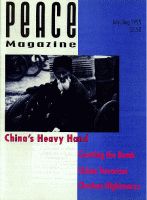
Peace Magazine Jul-Aug 1995, page 11. Some rights reserved.
Search for other articles by Shirley Farlinger here
An interview with Bruna Nota of COAT
BRUNA NOTA: Peace Links is a project of the Coalition to Oppose The Arms Trade (COAT) in Ottawa which links people in countries receiving armaments from Canada with Canadians and the Canadian government. For instance, Canada shipped aircraft components to Switzerland and China who assembled them for export to Burma.
The basic idea is for Canadians to tell people in the recipient countries about Canada's military exports to their governments and to ask them to write letters to the Canadian Department of Foreign Affairs. These letters from those who are victimized by our military exports, would tell Canadian officials why they should stop promoting the export of military equiptment to repressive governments.
Canada has one of the best laws in the world on the vetting of exports. But this doesn't say very much because 68% goes to the U.S. with no vetting and 5% to Europe with no checks. Over $5.5 million in military equipment, training, and software went to Algeria, which has internal repression. We also export to Bahrain, Bangladesh, and Brazil.
SHIRLEY FARLINGER: I understand General Motors in Ontario made armored vehicles which were used in the wars in Panama and Iraq. How do they get away with this?
NOTA: Canadians believe we wouldn't export arms without good reason and we'd always be careful of human rights records. But we sent Jeeps made at the General Motors plant in Windsor to Saudi Arabia. World leaders see this trade as a way of resolving conflicts and providing jobs. How can they look themselves in the mirror and think that's good leadership?
FARLINGER: What is the government's response to that?
NOTA: Canada says the shipments are for civilian use. What others do with them is none of our business. But we also export directly to countries with human rights violations. They claim if we don't sell the goods, others will, and we need the money. The Peace Links idea grew from the germ of a suggestion from Ferne Atkinson, a therapist who works with torture victims.
Talking with Richard Sanders (coordinator of COAT and editor of Press for Conversion) about Peace Links hooked me. He and I have been writing letters.
FARLINGER: How many letters have you sent?
NOTA: About 100. We'd like to get Canadian groups with links to people in other countries involved. Groups could get the information to them from COAT on what military goods Canada exports to their country. We can encourage people there to write to Andre Ouellet, asking him to stop the exports and explaining the harm these are doing in their area. COAT wants copies of all correspondence so that it can be publicized.
FARLINGER: How do people get involved?
NOTA: By subscribing to Press for Conversion and working with COAT contacts across the country. You can can me [416/760-8200] and get a sample letter but it's better if you know someone personally in a country that is receiving our arms. Send their letter to us or directly to Andre Ouellet with a copy to us.
FARLINGER: You met with your MP. How did you get along with Jesse Flis?
NOTA: Flis is the Parliamentary Assistant to Foreign Affairs. When we brought up our concern about Canada's military exports he explained that he had a conflict of interest: "I'm trying to sell CANDUs to Lithuania and China." We showed him our petition and asked him to bring it up in the House.
FARLINGER: What petition?
NOTA: It was a Voice of Women petition to stop the sale of CANDUs, nuclear technology, and weapons--that is, to stop the arms trade and convert the arms industry to civilian use. Flis said he could present it to the Clerk of the House but he could not defend it. However, we educate just by visiting. I am also a tax conscientious objector and active in the campaign for a Private Member's Bill to allow defence taxes to go to peace.
Shirley Farlinger is a Toronto journalist and long-time activist. Her latest book is A Million for Peace.

Peace Magazine Jul-Aug 1995, page 11. Some rights reserved.
Search for other articles by Shirley Farlinger here